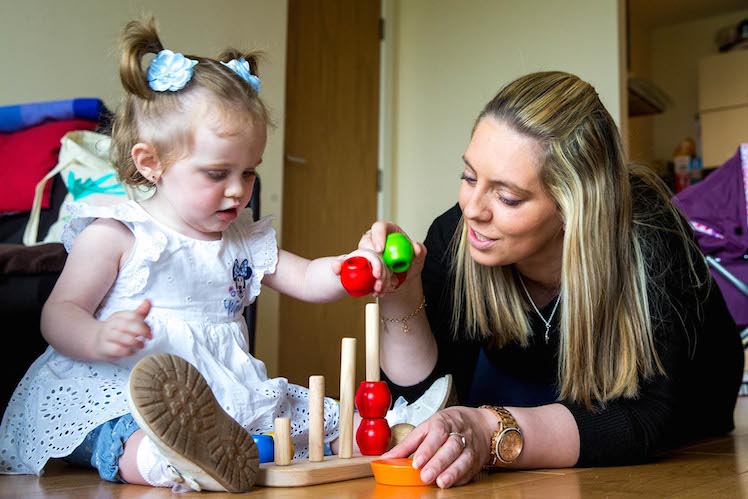Parental mentoring programme significantly boosts children’s IQs

Posted May 18, 2016
- Programme also improves children’s health and behaviour
- Study is one of first of its kind ever carried out in Ireland and Europe
- Parents received home visits from trained mentors
An early intervention programme evaluated by researchers at University College Dublin has significantly boosted children’s IQs and improved their behaviour.
The first in a series of results from the ‘Preparing for Life’ early childhood programme also had significant impacts on reducing children’s obesity levels and improving parenting skills and the home learning environment.
The study focused on intensively mentoring parents in areas with low levels of school readiness. From 2008 to 2013, the study and its evaluation team at UCD followed the lives of 233 parents who were randomly selected to join an intervention group or control group.
All participants received some supports, but the families in the intervention group received intensive parenting supports from midway through pregnancy until their children started primary school.
The intervention programme was evaluated by Principal Investigator Dr Orla Doyle, a senior researcher at the UCD Geary Institute and Lecturer in the UCD School of Economics, and the Early Childhood Research Team at the UCD Geary Institute for Public Policy.
Preparing for Life, a part of local community development company (opens in a new window)Northside Partnership, delivered the programme in the Dublin 17 and Dublin 5 areas of north Dublin.
Pictured top: Elaine McCann with her daughter Chloe who took part in the Preparing for Life, parenting mentoring programme in North Dublin which improved children’s IQ, health and behaviour.
Evidence had shown that over half of the children living in the Dublin 5 and Dublin 17 areas were starting school without the necessary skills to make a successful transition to school life.
The evaluation of the programme shows that by age four the IQ scores of the children in the intervention group were 10 points higher than the children in the control group.
Just 13% of children in the intervention group scored below average for cognitive development at age four compared to 57% of the control group.
The children whose parents received the intervention also had fewer behavioural problems (2% compared to 17%). They displayed fewer externalising problems, such as aggressive behaviour, and fewer internalising problems, such as anxious behaviour.
Children who received the intervention were also less likely to be overweight (23% compared to 41%).
Dr Orla Doyle presents Preparing for Life evaluation - investing in parents improves children's outcomes (opens in a new window)#pflresults (opens in a new window)pic.twitter.com/nlRZXSl0ka
— CES (@effectiveserv) (opens in a new window)May 17, 2016
The study is one of the first of its kind ever carried out in Ireland or Europe.
“These are all statistically significant and in some cases dramatic results. The programme has changed the life trajectories of these children; they are healthier, smarter and well-adjusted,” said Lead Researcher, Dr Orla Doyle.
Parents taking part in the study received approximately 50 home visits from trained mentors from various professional backgrounds during the programme cycle.
Parents in the intervention group were supported at each stage of their child’s development with the provision of tip sheets which provided best-practice information on issues such as parenting, pregnancy, and child health and development.
To record the impact of the programme, parents in both groups took part in research visits involving questionnaires, observations and direct assessments when their children reached six, 12, 18, 24, 36 and 48 months old.
“We believe that parents are the most important resource we have to improve child outcomes. By investing in and enabling parents, Preparing for Life has demonstrated that it is possible to significantly transform children’s lives,” said Manager of Preparing for Life, Noel Kelly.
Northside Partnership works to fight social and economic disadvantage and improve the opportunities for people and communities in north east Dublin.
The Preparing for Life programme was established in 2007 with funding from (opens in a new window)The Atlantic Philanthropies and the (opens in a new window)Department of Children and Youth Affairs through the Prevention and Early Intervention Programme (PEIP).
Looking forward to Preparing for Life - 48 mth results today - exciting results to share on improving outcomes for children (opens in a new window)@UCD_PFL_Eval
— NorthsidePartnership (@NS_Partnership) (opens in a new window)May 17, 2016
By: Jamie Deasy, digital journalist, UCD University Relations
UCD academics on The Conversation
- Opinion: The leap year is February 29, not December 32 due to a Roman calendar quirk – and fastidious medieval monks
- Opinion: Nigeria’s ban on alcohol sold in small sachets will help tackle underage drinking
- Opinion: Nostalgia in politics - Pan-European study sheds light on how (and why) parties appeal to the past in their election campaigns






